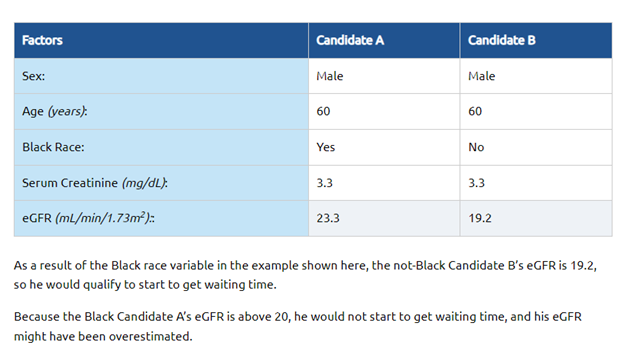As both the Senate and House continue their investigations into the organ transplant system (see Senate investigation and House investigation), and given the Biden Administration's ongoing focus on achieving health equity via Equity Action Plans, it comes as no surprise that significant changes are being made to improve fairness in the process for listing candidates on the national transplant waitlist. According to a recent report from the National Academies of Sciences, Engineering, and Medicine (NASEM), the U.S. organ transplant system is "demonstrably inequitable" (National Research Council. 2022. Realizing the Promise of Equity in the Organ Transplantation System. Washington, DC: The National Academies Press). With specific regard to the waitlist process, NASEM found that clinical policies that use race as a factor in determining the severity of disease may make it less likely for Black patients to be placed on the waitlist in a timely manner.
As the federally designated entity responsible for maintaining the transplantation waitlist, the Organ Procurement and Transplantation Network (OPTN) establishes and maintains transplant policies applicable to each of its member transplant hospitals, organ procurement organizations, and histocompatibility labs. According to the OPTN, 28 percent of those currently waiting for an organ transplant are Black. To help address these disparities, on June 27, 2022, the Board of Directors of the OPTN unanimously approved a policy requiring the use of race-neutral calculations (the Policy). Sponsored by the OPTN's Minority Affairs and Kidney Transplantation Committee, these changes affect all policies that reference estimated glomerular filtration rate (eGFR) and require all transplant hospitals to use race-neutral calculations for any purpose covered by OPTN policy. Under the Policy, transplant programs may update the date for which a patient qualified for transplant waitlist time if the transplant program is able to determine that the patient's wait time credit was based on a race-based policy. The OPTN notes that additional policies regarding waitlist credits may be developed later this summer.
By way of background, eGFR measures how slowly or quickly kidneys remove creatinine from the blood, a measurement that helps physicians determine the extent to which a patient is sick. eGFR is used as a qualifier for beginning time on the national kidney transplantation waitlist. According to the OPTN, and based on previous clinical studies showing that Black patients generally have higher levels of creatinine, some providers have historically incorporated a Black race variable that automatically increases eGFR values for all Black patients. Importantly, this adjustment can overestimate the kidney function of Black patients and disadvantage them by increasing their wait time for a transplant.
The OPTN provides the following illustration of how these calculations can put Black patients at a disadvantage:

In addition, this adjustment is overly simplified in that it only offers two options: "Black" or "Not Black," thus providing no consideration for multi-race individuals or genetic diversity within the community of patients who identify as Black.
Takeaways
Because the Policy is now in effect, transplant hospitals should take immediate steps to ensure that any eGFR calculations are race-neutral and do not include adjustments for Black or other minority patients. Notably, the current OPTN Policy does not mandate use of a specific eGFR formula as long as the chosen formula does not include race as a factor. Implementation of new calculations may necessitate organization-wide notice, formal policy revisions, updates to electronic medical records, and updated training for staff.
In addition, transplant hospitals should be prepared to answer patient questions about their eGFR calculations, and transplant hospitals that previously used race-based eGFR calculations should develop internal policies and procedures for reconsideration of, and readjustments to, patients' waitlist credits that may have been adversely affected by race-based calculations. Updated transplant policies should include a process that considers modifications to the date on which transplant candidates qualified for waiting time (such an adjustment could go as far back as the initial date of the candidate's registration for transplant) and wait time credit for certain patients.
For more information about or assistance with implementing these changes, please contact Melodie Hengerer, Tenia Clayton, or any member of the Baker Donelson Health Law Team.